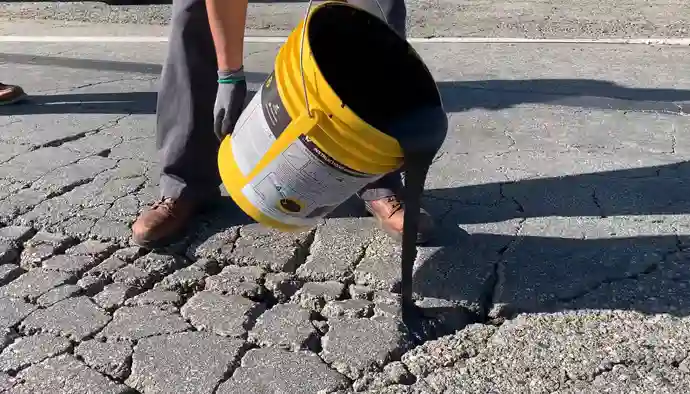Last Updated on June 20, 2023
If you have a concrete driveway, you may have noticed some cracks or chips in the surface. Or, if your concrete is older, you may see signs of crumbling and flaking.
While it’s normal for concrete to show some wear and tear over time, there are steps you can take to prevent further damage.
Applying a sealer is one of the best ways to protect your concrete and extend its lifespan. But with so many sealers on the market, how do you know which one to choose?
Need A Quick Decision? Just Follow This Table
The Top 3 Causes of Concrete Crumbling
Over time, even the best quality concrete can begin to crumble and flake. While there are a number of causes of this phenomenon, we will focus on three of the most common: weathering, poor quality concrete mix, and improper installation.
Weathering
One of the most common causes of concrete crumbling is weathering. Concrete is a porous material, which means that it can absorb water from rain, snow, and even humidity in the air.
When water seeps into the concrete, it begins to break down the structure from within, causing it to eventually crumble. The best way to protect concrete from weathering is to seal it with a waterproof coating.
This will create a barrier between the concrete and the elements, preventing water from seeping in and causing damage.
Poor Quality Concrete Mix
Another common cause of concrete crumbling is a poor quality concrete mix. In order to create strong, durable concrete, it is important to use a mix that has the right ratio of ingredients.
If too much sand or too little cement is used, for example, the resulting concrete will be weak and prone to crumbling.
Improper Installation
Lastly, another cause of crumbling concrete is improper installation. If concrete is not poured correctly or allowed to cure properly before being used, it will be much more likely to crumble over time.
Therefore, it is important to make sure that any concrete that you use has been installed correctly by a professional before using it in your home or business.
Here Are All the Features of the Best Concrete Sealer for Crumbling
Buying the Best Concrete Sealer for Your Crumbling Driveway
There are two main types of concrete sealers: film-forming sealers and Penetrating sealers.
Film-forming sealers sit on top of the concrete and form a protective layer that guards against water, oil, salt, and other stains.
Penetrating sealers penetrate deep into the concrete to create an invisible barrier that repels water and prevents salt damage.
When choosing a concrete sealer, you should consider the following factors:
- type of concrete (e.g., pavers, stamped concrete, etc.)
- location of the concrete (e.g., driveway, patio, pool deck)
- climate conditions in your area
- desired level of protection
- frequency of re-application needed.
For example, if you have a stamped concrete patio in a sunny area with moderate weather conditions, you would need a different type of sealer than someone with a pavers driveway in a cold climate.
Likewise, if you are looking for a heavy-duty sealer that will protect your investment for many years to come, you will want to choose a different product than someone who is more concerned with aesthetics and only needs light protection.
When to Apply Concrete Sealer
The best time to apply sealer is when the temperature is between 50 and 90 degrees Fahrenheit and there’s no chance of rain for at least 24 hours. If you apply the sealer when it’s too cold or too hot outside, the process won’t be as effective.
You should also avoid applying sealer in direct sunlight because it can cause the sealer to dry too quickly and leave behind streaks.
Preparing Your Concrete
Before you apply any type of sealer, you need to prepare your concrete by cleaning it thoroughly. Start by sweeping away any loose dirt or debris with a broom.
Then wash away any remaining dirt with a power washer or hose attachment. Once your concrete is completely dry, you can begin applying the sealer according to the manufacturer’s instructions.
How do you prevent concrete from crumbling?
Concrete is a mixture of cement, sand, aggregates (gravel or crushed stones), and water. The function of the cement is to bind the sand and aggregates together, while the water allows the concrete to be poured and molded into shape. Once the concrete dries, it forms a hard, durable surface.
The quality of the concrete depends on how well the ingredients are mixed together and how much water is used.
If too much water is added, then the concrete will be weak and will not last long. If too little water is used, then the concrete will be difficult to mix and will also be weak.
What are the benefits of sealing crumbling concrete?
Sealing crumbling concrete has several benefits, including:
- sealing the surface to prevent moisture penetration and deterioration
- restoring the appearance of the concrete
- providing a protective barrier against weathering and staining
- extending the life of the concrete surface.
Is crumbling concrete a sign of a bigger problem?
Yes. Crumbling concrete is generally a sign of a bigger problem, such as water damage or corrosion of the steel reinforcement bars.
Concrete is a very durable material, but it does have its limitations. The most common problems with concrete are water damage (caused by either rainwater or groundwater seeping into the concrete), corrosion of the steel reinforcement bars, and cracking (caused by drying shrinkage or thermal expansion).
If you see any signs of crumbling concrete, it’s important to have it inspected by a professional to determine the cause and to find out if there is any underlying structural damage that needs to be addressed.
Final Analysis
If your concrete driveway is starting to crumble and chip away, the best thing you can do is to apply a concrete sealer as soon as possible.
A good quality concrete sealer will protect your driveway from further damage and extend its lifespan by many years.
When choosing a concrete sealer, be sure to consider the severity of the damage and the climate in your area so that you can choose the type that’s right for you.



